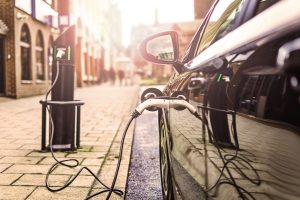What Maintenance Does an Electric Car Need?

Fewer moving parts, emissions and liquids means your EV (or electric vehicle) practically runs itself. Even software updates are done remotely without a car dealership in sight. So, what maintenance does an electric car need?
From time to time, certain components of your electric vehicle will need attention to guarantee safe and efficient working. Here’s the most important servicing points for electric vehicles to date.
Battery
Arguably, the most important part of an electric car – it’s certainly the largest and most expensive single component.
A visual inspection will confirm that the battery isn’t dented, isn’t leaking or causing any corrosion. Manufacturers encase the battery in tough materials to ensure that this is a rarity.
Like all electrical items, over time your battery will hold less charge. You won’t notice it for years and most tests have shown the first electric car batteries only losing noticeable amounts of mileage after they were 10-15 years old.
If your car is still worth servicing at this point, you should be able to replace the battery, but for most car owners it will make financial sense to replace the car and have the original recycled.
Brake wear
Since there is no combustion engine to speak of, the next largest mechanical moving parts are the brakes and suspension systems.
Many electric cars will use their brakes far less than ICE (internal combustion engine) cars. This is because once the foot is taken off the accelerator pedal, the motor will react in a way that is similar to applying the brakes in a normal car anyway.
This means you won’t excessively use the actual brakes on the car. However, as the most important safety feature, the brakes must be assessed for wear and tear like any other vehicle.
Tyre wear
Tyres are where an EV differs from an ICE car. Firstly, EVs weigh 20-30% more than their counterparts, due to the density of the battery pack. That means more weight bearing down on the tyres, pushing them into the ground.
This wears out the tread at a faster rate. Therefore, tyres must be checked thoroughly on EVs for signs of low tread, tears, delamination and other defects. Checking for proper wheel-balancing, alignment and rotating the tyres will certainly make them last much longer, too.
Top up the fluids
Brake fluid, steering fluid and windscreen wiper fluid are all still as important as they have ever been. Most people assume that an EV car won’t have a coolant system similar to their old ICE car.
However, they’re wrong. An EV has a coolant system that resembles an old system in that it uses liquid thermal management. In layman’s terms, this means it’s vital to replace or top up coolant levels to guarantee a safe and workable battery charge.
Replace the cabin air filter
Having polluted air in the cabin of an EV would be rather ironic. Cabin air filters work like they always have – sweeping the air entering the cabin of particulates, large (not so dangerous) and small (diesel particulates are microscopic and seriously unhealthy for the lungs).
Bodywork
Like a normal MOT and service, all the bodywork will be checked. This is so that it is safe with no sharp or rusty edges apparent. EV services will also inspect specific parts of the body and chassis that may suffer corrosion if battery leakage is present.
Specialising in all-things vehicle-related, Mr Tyre offer a wide range of services – including tyre fitting, servicing, MOTs, brakes and wheel alignment – at our branches across the region. For further information about our services or to book your vehicle in for an appointment with us, simply get in touch today.

